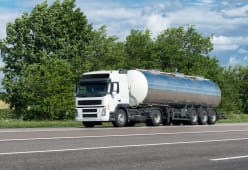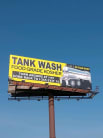Independently owned OU kosher-certified wash stations clean the interior of stainless steel tank trailers to ensure that they remain kosher compliant. These trailers often carry such items as milk, chocolate, juices, wine, vegetable oils, corn syrup and glycerin.
If a tanker trailer is part of an OU kosher-certified dedicated fleet, then only a kosher maintenance wash is necessary. Such a wash can be of any duration with no temperature restrictions. Still, in these washes, there can no be no recycled water used from a previous trailer wash, to avoid non-kosher contamination.
But trucks that are not part of an OU kosher-certified dedicated fleet must undergo an upgraded kosher wash. As we will see, this has specific requirements. Truckers can take advantage of OU kosher-certified wash stations throughout the country.
I spoke with Doug Harkness, the owner of American Tank Wash Partners, LLC in Jeffersonville, Indiana, a major OU kosher-certified wash station. He views both kosher maintenance washes and kosher upgrade washes as the most thorough. He says that many truckers request the upgraded kosher one, knowing that such a wash fully removes any embedded bulk liquids from the walls and offers a systematic cleaning so that the next load will be placed in a fully cleaned out tanker.
Let us explore food-grade bulk liquid cleaning to understand what kosher requirements are necessary to effectuate a kosher maintenance and upgraded wash, how it relates to vessels and railcars, detailed trailer industry notes and an in-depth look at American Tank Wash Partners, LLC.
The Kosher Maintenance and Upgraded Wash
Rabbi Yitzchak Twersky oversees the kosher aspect of bulk transportation for the OU and has delineated the rules that apply for all kosher washes.
The first kind, the kosher maintenance wash, has less stricter requirements than the kosher upgraded wash. This is because it applies to OU kosher-certified trailers that are already designated to carry kosher loads. Therefore, the concern for absorption of non-kosher residue into the tank walls is not applicable. But recycled water can’t be used in this wash, as it might be coming from a previous wash of a non-kosher trailer.
However, for trailers that are not dedicated to carry kosher loads, a stricter wash requirement is necessary. Such a stricter wash addresses any possible non-kosher residue that could have become absorbed into the walls from previous loads.
For an upgraded kosher wash, the first step is a detergent wash done with water for 15 minutes at a temperature of 190°F or above. After this is completed, a second rinse for 15 minutes is done with water at 190°F or above.
For dairy, an upgraded kosher wash is necessary after a trailer hauls kosher dairy products heated above 115°F that is needed for non-dairy service or after carrying a kosher dairy load for a consecutive period of 24 hours and is needed for non-dairy service.
Of course, no recycled water can be used for the upgraded kosher wash.
A Tanker Vessel Kosher Vignette
Imagine the scene. The CEO of OU Kosher, Rabbi Menachem Genack, travels to an enormous vessel with one of the rabbinic consultants to the OU, Rabbi Yisroel Belsky, zt”l, to determine the viability of a tank of palm oil. As Yated Ne’eman reported, “Rabbi Genack recalled that there was a question regarding the kosher status of oil contained in [a] massive, seven-story tall oil tanker[s]. Rav Belsky himself climbed up a seven-story ladder and climbed into the tanker[s] to ascertain the actual facts in order to render a p’sak [ruling].”
It happened to be that in this case the OU was able to rely on the kosher legal concept known as sixty to one, where if the volume of the liquid contained in the tank is sixty times more than the walls of the tank, the liquid food can be kosher.
This episode highlights how bulk transport can present complicated issues, how seriously the OU will investigate that all bulk transport is certified kosher and how sensitive the OU is to possible fiscal loss for a customer.
Exploring Kosherized Railcar Food-Grade Bulk Liquid Transport
I spoke with Steven Ettinger, Senior VP, Production Planning & BIDS, of The Greebrier Companies, a major manufacturer of OU kosher-certified railcars. They manage over 100,000 railcars throughout the US. Many large OU kosher-certified companies, such as Cargill, ADM and Bunge purchase railcars from them to ensure kosher transport.
As Ettinger explained to me, rail differs from other transport industries because their steel interior is built differently. Therefore, Greenbrier lines the interior walls of railcars with epoxy linings, that are organic compounds or mineral oils, both of which are innocuous ingredients and kosher. This forms a protective lining on the walls. A second option for rail kosherization is a steam treatment at a 200°F level. Regarding these kosherization options, Rabbi Twersky noted that “Linings and washes are not interdependent. They can get both.”
Most Bulk Liquid Transport is by Truck
In 2022, freight carried by trucks accounted for more than 80 percent of all revenue by transport and generated more than $940 billion in revenue within the trucking industry. There are more than thirteen million trucks in service which employs more than three million drivers. Within food transportation, more than 70 percent of deliveries are made with trucks.
The government has set strict standards for hygiene requirements as relates to food transport. It’s based upon the Sanitary Food Transportation Act of 2005 which became the basis for the Food Safety Modernization Act (FSMA). It serves to ensure that all aspects of the transport process, including temperature controls, loading, safety and other relevant factors are in order.
Because of the sheer volume of food-grade liquid material transported by bulk trailers and the sensitive nature of cleanliness, kosher washes have become very common. It’s in tune with maintaining no cross-contamination of foods and the bolstering of cleanliness to new levels.
OU Kosher-Certified American Tank Wash Partners, LLC
Doug Harkness, upon opening his tank washing business, was advised by his father to only perform uniform washes, and not create his own kind of wash. Harkness took this advice seriously and it matches with his current operation where he offers systematic washes, his kosher maintenance wash and kosher upgraded wash being prime examples.
He said that many truckers insist on the upgraded kosher wash because they know it offers the highest standards in cleanliness and ensures kosher compliance, giving them confidence that they can now carry kosher loads.
Because his father and brother are computer programmers, they created a computerized system that monitors every wash and stores all the information. This system allows him to easily share the records with OU Kosher in real-time, confirming that he conformed with all kosher requirements.
He is near many food companies in Indiana and is therefore involved in offering many kosher washes. He is a true model of someone who is using kosher washes to improve food-grade liquid transport.
Conclusion
As much as companies need to be concerned with attaining kosher certification for products, they need to ensure that the equipment transporting these materials are kosher compliant. OU Kosher is sensitive to certifying transport in the same way it is to certifying products. Upgraded kosher washes are the choice of many operators due to its all-inclusive nature. Pulling up to an OU kosher-certified wash station and engaging in an upgraded kosher wash gives a company the luxury of knowing that future food loads will be kosher compliant, protected and secure.








